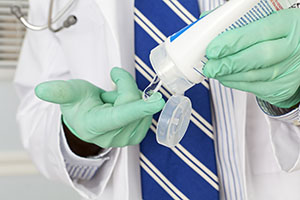Prostatitis Treatment in Hudson, FL

The prostate is a walnut-sized gland located just below the bladder. It produces prostatic fluid to help transport sperm through the urethra. Prostatitis is an umbrella term for infection and inflammation of the prostate gland, which most commonly affects males over the age of 50.
Urologists can have trouble diagnosing and identifying the cause of prostatitis dysfunctions. Whether the cause turns out to be structural, viral, or bacterial, if you have painful or bloody urination and abdominal pain seek medical attention immediately – untreated prostatitis can lead to severe complications.
If you’re experiencing prostate pain or groin discomfort, speak with a prostatitis specialist today in Hudson by calling (813) 536-3212 or contact Evolution online to confirm or rule out prostate disease.
Prostatitis symptoms
Prostatitis symptoms often include urination issues like:
- pain or burning when urinating
- difficulty urinating
- frequent urination, especially at night
- cloudy or bloody urine
- urine with pus or white blood cells in it
- foul-smelling urine
Other symptoms include:
- abdomen, groin, or lower back pain
- pain between testicles and anus (perineum)
- painful ejaculations
- erectile dysfunction
- urinary tract infection
- influenza(in bacterial prostatitis)
Chronic prostatitis symptoms can last for months. Some forms of prostatitis (asymptomatic inflammatory) don’t cause symptoms and are only detected through elevated prostate-specific antigen levels.
Complications of prostatitis include:
- urinary retention
- abscess (puss-filled sac) in the prostate
- sepsis
- infertility
- epididymitis, or an inflamed epididymis (tube on the back of the testicles)
What causes prostatitis symptoms?
The exact causes of prostatitis are not completely understood – they are being debated by the most highly regarded experts, as is the slew of available treatments.
Many cases of prostatitis are caused by bacteria, and while some patients are easily treated only once (acute), other patients experience recurrent (chronic bacterial) prostatitis. Chronic prostatitis (or chronic pelvic pain syndrome) is prostatitis caused by factors other than bacteria, while asymptomatic inflammatory prostatitis also shows no signs of an infection.
Top urology experts are studying these potential prostatitis causes and prescribing appropriate treatments:
- bacteria: such as Staphylococcus aureus or E. coli, the later which also cause urinary tract infections; acute prostatitis with fever is likely bacterial in nature, and will most likely respond to antibiotics
- fungi: men with low prostate-specific antigen numbers and chronic prostatitis that haven’t responded to antibiotics are likely suffering from Candida colonization of the prostate; antibiotics intensify it
- sexually transmitted bacteria: HIV/AIDS and gonorrhea have been known to cause prostatitis symptoms
- auto-immune response: nonbacterial chronic prostatitis patients have increased levels of white blood cells in their prostate fluid, so causes could include autoimmune diseases like irritable bowel syndrome
- allergy: from coffee to spices, legumes, and penicillin, many men have resolved symptoms by refraining from allergens
- yeast infestation: many studies have shown links between yeast and chronic prostatitis
- physical injury or tension: an injury-disordered pelvic floor musculature, a blockage in the urethra that causes backflow, or urine reflux or injury to the spinal disks in the lower back (sometimes after surgery) have all caused these symptoms
- a uric acid disorder: urinary reflux in the prostatic ducts has been related to prostatic pain and secretion of concentrated urate
- prostate stones: can be little warehouses for bacteria
- benign prostatic hyperplasia (BPH): a non-cancerous growth of the prostate
- a virus: a few studies have shown that herpesvirus 8 may be sexually transmitted and stimulate prostatitis, leading to prostate cancer1
Inflammation is never the same for each patient, and neither is the treatment outcome. Also, prostatitis could be several different diseases which present with the same or similar sets of symptoms in different men. So, discovering the causes and deciding which treatments to try first will require patience and determination from you and your healthcare provider.
Risk factors of prostatitis include:
- being over 50
- history of urinary tract infections
- having rectal intercourse
- a history of prostatitis
- previously wearing a urinary catheter
- history of prostate biopsy
- dehydration
Prostatitis diagnostics
To make a prostate diagnosis, your medical provider will physically exam you and discuss your symptoms, medical history, and any medications you’re taking. If your medical provider suspects prostatitis, you’ll undergo one or more of these tests:
- rectal exam: if you’ve ever wondered, "what is a prostate exam", your medical provider inspects your prostate with a gloved, lubricated finger to detect swelling or abnormalities
- urine test: detects and identifies signs of infection in the urinary tract
- blood tests: detects white blood cell count and bacteria
- imaging tests: CT scans, x-rays, or MRIs of the urinary tract and prostate provide detailed images of prostate swelling
- post-prostatic massage: to extract expressed prostatic secretions (EPS)
Treatments for prostatitis
For immediate but temporary relief of symptoms, try:
- sitting in a warm bath (sitz bath)
- using a heating pad on the affected area
- avoiding alcohol, caffeine, and spicy acidic foods
- not sitting or biking for long periods
- increasing intake of non-alcoholic, caffeine-free fluids
If your healthcare provider has performed all known tests and has a strong suspicion of a cause, he or she will try prescribing the following treatments to see which may resolve symptoms:
Prostate massage
About 50% of men with chronic nonbacterial prostatitis have pelvic floor muscle disorders contributing to their pain.
Prostate massage can resolve pelvic floor disorders by improving muscle tone, enhancing blood flow, improving urinary flow, and helping to maintain the integrity of the prostate tissue. Improved blood flow delivers oxygen, essential nutrients, and white blood cells, which help fight infection. Massage also stimulates the release of prostatic fluid to open up channels in the prostate and reduce inflammation.
Do not undergo a prostate massage if you have epididymitis (inflammation of the tubes on the testicles). Side effects of the procedure—especially if done incorrectly—include:
- bleeding around the prostate
- spreading the disease to the blood
- small tears in the lining of the anus
- hemorrhoid flares
- cellulitis
Undergoing a prostate exam with a trained healthcare provider carries a lower risk of these complications than if trying to do it yourself.
Acupuncture
In more than 60 years of clinical research, acupuncture for prostatitis provided statistically significant benefits when it came to resolving symptoms. The efficacy of the acupuncture treatments also improved over time.
Acupuncture and other natural therapies are an important part of the holistic NPAT treatment developed by naturopathic urologist Dr. Geo Espinosa. NPAT stands for:
- Natural treatments (ALCAT, elimination diets, and wheat-free diets)
- Phytotherapy (pollen and quercetin together with probiotics)
- Alternative Treatments (acupuncture, prostate massage, pelvic rehabilitation, and therapy)
- Total body (exercise, chronic stress management, lifestyle)
Side effects of acupuncture include bleeding, swelling, or soreness around the sites where the needles are placed. If incorrectly place or unclean, the needles may puncture nearby organs or cause infections respectfully.
Biofeedback
Biofeedback trains patients to control certain bodily functions that are normally involuntary, such as heart rate, blood pressure, and some types of muscle tension. A biofeedback therapist can help teach men to relax the pelvic floor muscles (which help support the bladder and control urine flow) by delivering feedback via electrodes.
Men can practice and gradually work to achieve the same responses without the device. There are no major side effects of biofeedback, though the procedure is not recommended for patients with seizures.
Recent clinical trials of new treatments like sonoelectromagnetic (SEM) therapy, botulinum toxin (Botox), and corticosteroids show promise for relieving painful symptoms and reducing prostate swelling.2 Research into these new therapies is ongoing.
Botanical medicine
If the cause of prostatitis turns out not to be fungal, then your healthcare provider may try an anti-inflammatory approach, which is often achieved with botanical treatments.
Saw palmetto comes from the American dwarf palm tree and contains fatty acids and sterols such as beta-sitosterol. It has been shown to decrease the level of dihydrotestosterone (DHT), a male hormone linked to enlarged prostate. As a Tier 2 supplement, saw palmetto has significant clinical studies and research behind it.
In one clinical trial, a group of prostatitis patients took antibiotics, while another took antibiotics along with a formulation that contained saw palmetto, curcumin, quercetin, and several other natural ingredients. Nearly 90% of patients who took the supplement said their symptoms were gone after one month, compared to 27% of the men who took only the antibiotic. None of the men in the supplement group had a recurrence of prostatitis during the six months that followed. Patients who did not use the supplement experienced persistent problems.3
Potential side effects of saw palmetto include headache, dizziness, vomiting, and diarrhea.
Pharmaceutical medications
The symptoms of prostatitis have been traditionally treated with:
- antibiotics: usually given in pill form and taken for 4-6 weeks; for severe prostatitis they’re delivered intravenously; some antibiotics can perpetuate yeast infections, and bacteria are fast becoming resistant to antibiotics;
- alpha-blockers: to relax the bladder and muscle fibers near your prostate, relieving painful symptoms; may cause nausea, diarrhea, and abdominal pain; long term use has been linked to strokes
- non-steroidal anti-inflammatories (NSAIDs): over-the-counter painkillers help relieve pain and inflammation; side effects include heartburn , high blood pressure, an increased risk of bleeding, and tinnitus; long term use can increase risk of heart disease
Antifungal regimen
Many men do not respond to pharmaceutical treatment, or even experience side effects from it. For them, healthcare providers have prescribed antifungal treatment. A study published in the Central European Journal of Urology, 1000 patients were put on a low carbohydrate diet, had their urine alkalinized with potassium citrate, and were administered fluconazole daily for two weeks. At the trial’s end, 80% saw an improvement of their pre-treatment symptoms.4 Side effects of antifungal treatments include itching, redness, and malaise.
Reserve Your Appointment Now
Once its cause has been determined, prostatitis is usually treated effectively. Severe cases, however, can lead to dangerous complications if left untreated. It’s best to get medical attention in the early stages. To speak with a prostatitis specialist today in Hudson, call (813) 536-3212 or contact Evolution online.
Sources
- 1. Hoffman LJ, Bunker CH, Pellett PE, Trump DL, Patrick AL, Dollard SC, Keenan HA, Jenkins FJ: Elevated seroprevalence of human herpesvirus 8 among men with prostate cancer. J Infect Dis. 2004 Jan 1;189(1):15-20. Epub 2003 Dec 31.
- 2. Sandhu, Jaspreet, and Hin Yu Vincent Tu. “Recent Advances in Managing Chronic Prostatitis/Chronic Pelvic Pain Syndrome.” F1000Research, Urology Service, Department of Surgery, Memorial Sloan Kettering Cancer Center, New York USA, 25 Sept. 2017, f1000research.com/articles/6-1747/v1.
- 3. Morgia G, Mucciardi G, Galì A, Madonia M, Marchese F, Di Benedetto A, Romano G. Treatment of chronic prostatitis/chronic pelvic pain syndrome category IIIA with Serenoa repens plus selenium and lycopene (Profluss) versus S. repens alone: an Italian randomized multicenter-controlled study. Urol Int. 2010;84(4):400-6. doi: 10.1159/000302716. Epub 2010 Mar 24.
- 4. Ahmed Fouad Kotb, Asmaa Mohamed Ismail, Mohamed Sharafeldeen, and Elsayed Yahia Elsayed. Chronic prostatitis/chronic pelvic pain syndrome: the role of an antifungal regimen. Cent European J Urol 2013; 66(2): 196–199.
Evolution
Address
4691 Van Dyke RoadLutz, FL 33558
(813) 536-3212
www.evolution4health.com
Hours
Mon:
10:00 am - 4:00 pm
Tue:
10:00 am - 4:00 pm
Wed:
10:00 am - 5:00 pm
Thu:
10:00 am - 6:00 pm
Fri:
10:00 am - 3:00 pm
Sat:
Closed
Sun:
Closed

